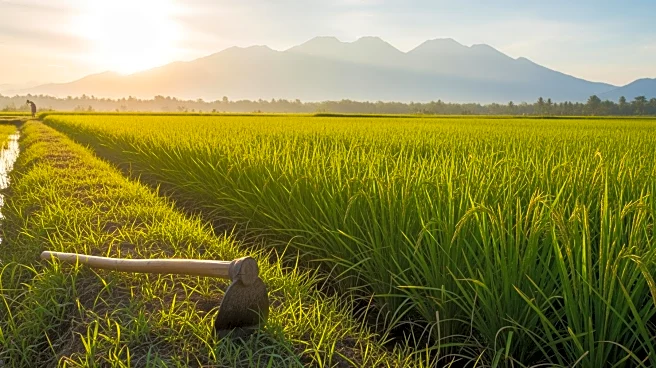What's Happening?
Indonesia's Agriculture Minister, Andi Amran Sulaiman, has reaffirmed the country's commitment to achieving food sovereignty through increased agricultural production and efficiency. This initiative is in response to the global food crisis, which has seen
over 295 million people in 53 countries experiencing acute food insecurity, according to the World Food Programme. President Prabowo Subianto has signed a decree to establish food self-sufficiency zones nationwide, aiming for full self-sufficiency by 2028. The focus is on enhancing agriculture, empowering farmers, and sustainable production, with priority commodities including rice, corn, sugar, soybeans, sorghum, horticultural products, and potatoes. Indonesia is projected to reduce rice imports significantly, achieving a surplus of 4 million tons by the end of 2025.
Why It's Important?
The move towards food sovereignty is crucial for Indonesia as it seeks to reduce dependence on imports and strengthen its food security. This initiative could have significant implications for the country's economy, potentially boosting agricultural productivity and creating job opportunities. By achieving food sovereignty, Indonesia can better withstand global food crises and ensure the welfare of its population. The focus on sustainable production and farmer empowerment aligns with global trends towards environmentally friendly and socially responsible agricultural practices.
What's Next?
Indonesia's government will continue to implement simultaneous food planting programs, distribute agricultural machinery, and utilize superior seeds to maintain productivity amid global climate challenges. The success of these initiatives will depend on cross-sector collaboration and the collective hard work of agricultural personnel. As Indonesia progresses towards its 2028 self-sufficiency target, monitoring and adjustments to the strategy may be necessary to address unforeseen challenges and ensure the achievement of food sovereignty.
Beyond the Headlines
The push for food sovereignty in Indonesia highlights the ethical and social dimensions of agricultural policy. By prioritizing local production and reducing imports, Indonesia is taking a stand against global dependency and promoting self-reliance. This approach may inspire other nations facing similar challenges to adopt similar strategies, potentially leading to a shift in global agricultural practices.
















